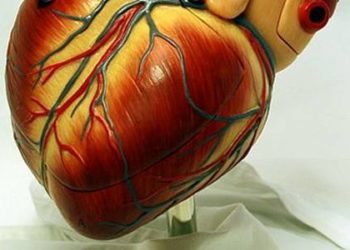New genetic link between type 2 diabetes and coronary heart disease
Image: PD
1. This genome-wide association study (GWAS) has shown a single nucleotide polymorphism (SNP) on chromosome 1 to be associated with coronary heart disease in individuals with type 2 diabetes, but not in individuals without type 2 diabetes.
2. The SNP identified in this study (rs10911021) is in the same region as the GLUL gene on chromosome 1, which may suggest that differences in glutamine and glutamic acid metabolism contribute to the increased risk of coronary heart disease in diabetics.
Evidence Rating Level: 2 (Good)
Study Rundown: Type 2 diabetics have an increased risk of developing coronary heart disease (CHD), a major cause of morbidity and mortality in this population. It has been established that genetics play a role in CHD risk. Many studies have demonstrated that there are differences in the genetic risk factors for CHD between people with and without diabetes. This study performed a genome-wide association study (GWAS) on individuals from five large cohort studies—the Nurses’ Health Study, the Health Professionals Follow-up Study, the Joslin Heart Study, the Gargano Heart Study, and the Catanzaro Study—to study the differences in genetic risk factors for CHD between diabetics and non-diabetics. The investigators identified one single nucleotide polymorphism in chromosome 1, rs10911021, that was found significantly more frequently in diabetics with CHD than non-diabetic controls with CHD. This gene is located in close proximity to the GLUL gene, which mediates glutamate and glutamic acid metabolism. Furthermore, a difference in the plasma levels of the intermediates of glutamine/glutamic acid metabolism was seen in homozygotes for rs10911021 in a case-control study comparing CHD diabetics in comparison to non-CHD diabetics.
Based upon these findings, the authors suggest that the polymorphism and differences in glutamine and glutamic acid metabolism may be a contributor to the pathogenesis of CHD in the diabetic population. Strengths of this study include the large sample size and participants from multiple different large cohort studies. A weakness of this study is the fact that the population studied was composed of all non-Hispanic white individuals, so results found in this study may not apply to other populations. While this study indicates a possible relationship between glutamine/glutamic acid metabolism and CHD in diabetics, more research is required to elucidate the mechanism.
Click to read the study, published today in JAMA
Relevant Reading: Genetic susceptibility to coronary heart disease in type 2 diabetes: 3 independent studies
In-Depth [genome-wide association study]: This study included non-Hispitanic Whites from the Nurses’ Health Study, the Health Professionals Follow-up Study, the Joslin Heart Study, the Gargano Heart Study, and the Catanzaro Study. A three-stage GWAS was performed on 1,517 CHD cases and 2,671 controls without CHD, all of whom had type 2 diabetes. One genetic variant, rs10911021, showed association with CHD (OR 1.36, 95% CI 1.22-1.51, p=2.0×10-8). No effect was detected with this genetic variation in non-diabetic participants (OR 0.99, 95% CI 0.87-1.13, p=0.89). Given the proximity of the polymorphism to the GLUL gene, which codes for glutamine synthase, the authors investigated levels of glutamine metabolites in a case-control design. Among 100 participants from the Joslin Heart Study, the ratio of pyroglutamic-to-glutamic acid ratio was significantly lower in the CHD diabetics than in non-CHD diabetics (p=0.02), suggesting less glutamine/glutamic acid metabolism in these individuals.
By Jeffrey Cohen and Rif Rahman
More from this author: Link of low vitamin D with coronary heart disease varies by race, Most physicians point to others to control healthcare costs, QRS morphology and duration associated with cardiac resynchronization outcomes
© 2013 2minutemedicine.com. All rights reserved. No works may be reproduced without expressed written consent from 2minutemedicine.com. Disclaimer: We present factual information directly from peer reviewed medical journals. No post should be construed as medical advice and is not intended as such by the authors, editors, staff or by 2minutemedicine.com. PLEASE SEE A HEALTHCARE PROVIDER IN YOUR AREA IF YOU SEEK MEDICAL ADVICE OF ANY SORT.






